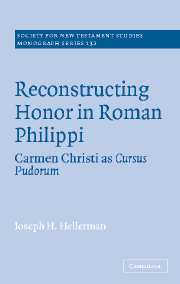Book contents
- Frontmatter
- Contents
- Acknowledgments
- List of abbreviations
- Introduction
- 1 Roman social organization
- 2 Preoccupation with honor and the cursus honorum
- 3 The Roman colony at Philippi
- 4 Honor and status in Philippi
- 5 Acts and Philippians
- 6 Carmen Christi as cursus pudorum
- 7 Summary and conclusion
- Notes
- References
- Index of ancient sources
- Index of modern authors
- Subject index
3 - The Roman colony at Philippi
Published online by Cambridge University Press: 22 September 2009
- Frontmatter
- Contents
- Acknowledgments
- List of abbreviations
- Introduction
- 1 Roman social organization
- 2 Preoccupation with honor and the cursus honorum
- 3 The Roman colony at Philippi
- 4 Honor and status in Philippi
- 5 Acts and Philippians
- 6 Carmen Christi as cursus pudorum
- 7 Summary and conclusion
- Notes
- References
- Index of ancient sources
- Index of modern authors
- Subject index
Summary
This people, in turn – how many colonies has it sent to every province! Wherever the Roman conquers, there he dwells.
Seneca (Helv. 7.7)Chapters three and four narrow the focus of the present overview of Roman social stratification and honor-seeking to an examination of the Roman colony at Philippi. I will seek to demonstrate that the settlement was deeply marked by the social verticality and concern for personal and familial honor which characterized the broader Roman world. The present chapter briefly surveys the history of Philippi as a military colony, with special emphasis upon the hierarchy of rank and the competition for honors which characterized the Roman army. A discussion of the honors associated with the imperial cult, and the function of the cult in reinforcing the social order of the colony, concludes the chapter. Chapter four will continue to draw upon epigraphic data in order to underline the marked social verticality of Philippi as reflected in burial inscriptions and in municipal honors and public recognition that the local elite received for various acts of benefaction. Similar practices among non-elite cult groups will also be examined. Evidence cited for the presence of a replicated cursus, in both civic and religious spheres, will prove particularly important for the discussion of Paul's letter to the Christian community at Philippi, to be undertaken in the final portion of this monograph.
History of the colony
Philippi's origins can be traced to pre-Hellenistic times.
- Type
- Chapter
- Information
- Reconstructing Honor in Roman PhilippiCarmen Christi as Cursus Pudorum, pp. 64 - 87Publisher: Cambridge University PressPrint publication year: 2005



